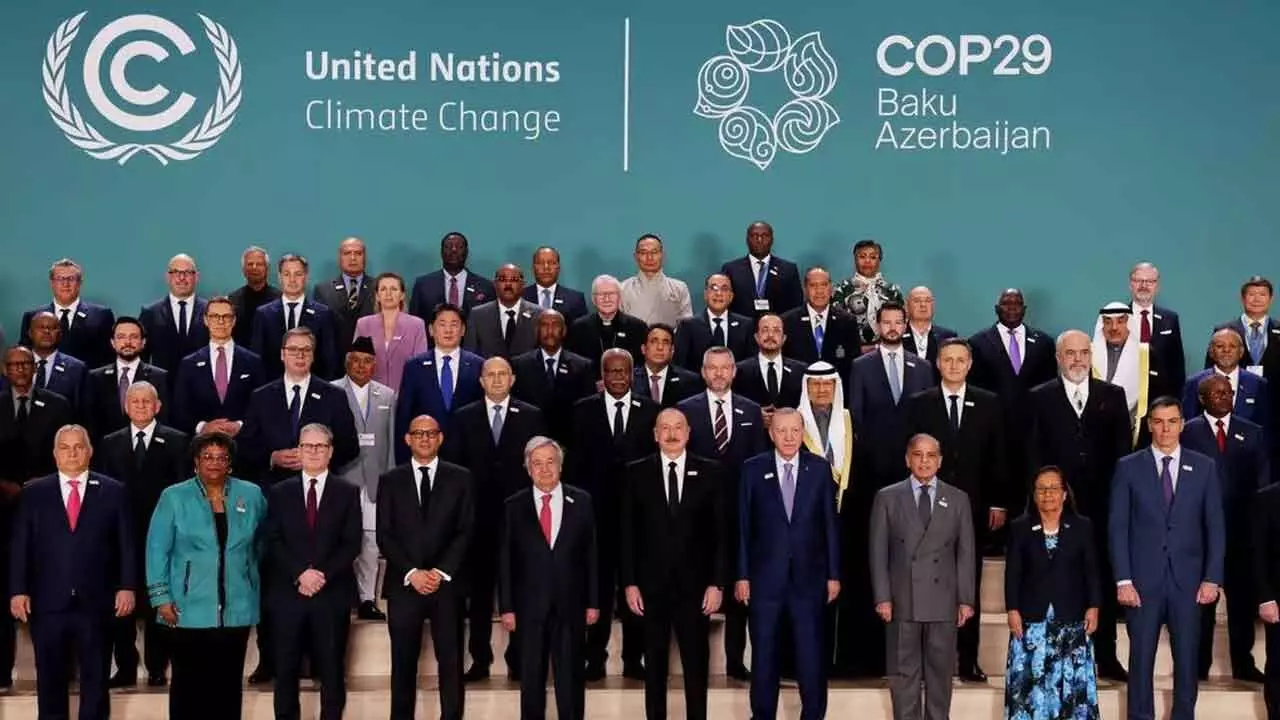COP 29 Meet Ends In Members Agreeing To $300 Billion Annual Fund By 2035
The conference also agreed on carbon markets, which earlier could not be decided
COP 29 Meet Ends In Members Agreeing To $300 Billion Annual Fund By 2035

According to Simon Still, Executive Secretary of UN Climate Change, "this new finance goal is an insurance policy for humanity, amidst worsening climate impacts hitting every country"
The COP 29 UN Climate Change Conference that was attended by 200 countries, ended in Baku Azerbaijan on November 24.
The main objective was to arrive at a New Collective Quantified Goal on Climate Finance (NCQG) that was to be higher than the earlier agreed goal of $100 billion annually. This figured stemmed from different estimates and demand from developing countries and the demand to include China, the Middle East and India in the countries of developed countries for the purpose of contribution towards climate finance. However, this was resisted and not acceptable as they are still developing countries, even though in terms of greenhouse gas emissions after USA, China and India fall are in the second and third position. There is a vast difference between US and China against India, which is only very small portion of the overall global emissions.
This is more so against the estimated amount of climate finance of $1.3 trillion per year by 2035. The final figure that was arrived at was $300 billion annually by 2035. This figure definitely needs to be enhanced by efforts of all actors, who have to work together to scale up finance to developing countries from public and private sources. This new figure of $300 billion annually by 2035 was agreed after two weeks of intensive negotiations and several years of preparatory work, in a process that requires all nations to unanimously agree on every word of the agreement.
Even though this newly arrived amount is much less than the required amount, it is much better than the earlier agreed amount.
According to Simon Still, Executive Secretary of UN Climate Change, "this new finance goal is an insurance policy for humanity, amidst worsening climate impacts hitting every country".
He further adds that "but like any insurance policy -it only works-if premiums are paid in full, and on time".
He adds, "It will keep the clean energy boom growing, helping all countries to share in its huge benefits, more jobs, stronger growth, cheaper and clean energy for all".
The earlier COP 27 and COO 28 had helped in establishing ‘Loss and Damage Fund’ and the need to transition away from fossil fuels in energy systems swiftly and fairly by tripling renewal energy and boosting climate finance. The outcome of the latest Collective Quantified Goal comes from the groundwork done earlier. COP 29 also agreed on carbon markets which earlier could not be decided, as this agreement on carbon markets will help countries deliver their climate plans more quickly and cheaply and make faster progress in having global emissions this decade as required by science,
However, the outcome of COP 29 does not meet the expectations of all stakeholders and it cannot be deemed a victory. But certainly it is a major step in the proper direction and there is a need to take up enhanced steps in the process of high investment towards renewable energy, formulate and submit new enhanced ambitions as per the new determined contributions 3.0, which are to be submitted by early 2025. This is because more action and adaptation and mitigation measures are needed to keep the 1.5°C warming limit within reach.
There are indications that both UK and Brazil plan to ramp up climate action in their NDC 3.0. In the interest of planet and livelihoods, all stakeholders should aim at similar response and scale up climate action in their respective countries as we are already behind in terms of collective efforts. Any adverse climate temperature beyond 1.5°C or at least beyond 2.0°C will have substantial adverse consequences and result in global failure.
The next COP 30 will be held at Brazil and there will be further expectation as by that time NDC 3.0 would have been submitted and energy transition must have moved forward in most of the countries. Brazil just concluded a G20 meeting. The world leaders committed to taxing billionaires, tacking inequalities and taking climate action.
The G20 at Brazil was able to agree on a declaration which addresses social inclusion, to fight against hunger and poverty along with the need to taxation of billionaires, measures for energy transition, the global governance reform and acceleration of climate action.
The leaders in G20, accounting for more than 80 per cent of global GDP, achieved consensus for addressing global challenges and promoting strong, sustainable and inclusive growth. The need to strengthen the United Nations, modernising the international financial system, fostering an inclusive multilateral trading system and promoting ethical development of artificial intelligence were some of the important issues that received their attention.
The fight against hunger and poverty as envisaged under Sustainable Development Goals (SDGs) as goal number one is very important as suffering on account of poverty and hunger still exists in the world, and SDG efforts are underway to achieve the goals by 2030.
As per the latest review, the world is not on track to achieve this objective as Covid-19 led to progress reversals in 2022. An estimated 670 million people were living in extreme poverty. Similarly, in 2022, 735 million people were chronically hungry. The world is also facing moderate to severe food insecurity with 2.4 billion people affected.
While it is appreciable that both COP 29 and G20 summit resulted in positive results, there must be efforts by global leaders to ease the ongoing Russia and Ukraine war as well as Israel and Hamas conflict.
Trust there will be equal attention to this vital area to achieve success in bringing world peace.
(The author is former Chairman & Managing Director of Indian Overseas Bank)

